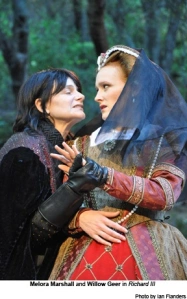Cultural Cocktail Hour
Review: Rooting for the villain- the seductive powers of Richard III at Theatricum Botanicum

Rooting for the villain: the seductive powers of Richard III at Theatricum Botanicum
By Leticia Marie Sanchez
Nestled in a wooded glen, underneath the evening stars and accompanied by the hypnotic hum of crickets, Topanaga Canyon’s Theatricum Botanicum adds a dose of magic to Shakespeare. The outdoor Globe-like theater simultaneously infuses the Bard with reality and wonder.
The march of Richard III’s army down dark, forest-like hills conveys a dimension of realism and immediacy that cannot be matched by an enclosed venue. Similarly, the towering loft used during the Tower of London murder scene enhanced the mysterious mood. The vast verdant set suspended the audience’s disbelief, as did the cast of talented actors in the Theatricum’s production of Richard III.
On Saturday night’s performance, Melora Marshall starred as the protean protagonist, triumphantly suspending the audience’s disbelief that the Machiavellian king could be played by a woman. With a small frame and intense, red-rimmed eyes, Ms. Marshall illustrated that the true source of Richard III’s power emanated from his cunning speech and a knack for manipulation. Marshall elicited sympathy for the murderous monarch not only through her constant limp, but more importantly via the edgy humor that she brought to the role. Marshall’s appealing underdog Richard III is akin to the archetypal schoolyard outcast who through sheer force of determination (and sarcastic zingers) manages to court the most popular girl, topple the In Crowd, and get the audience to root for him. Marshall’s comedic delivery of the line in Act I “Was ever woman in this humor wooed?” (after Richard’s brazen courting of Lady Anne at her husband’s funeral) added lightness to Richard’s realization of his dark powers. The casting of the tall Christopher W. Jones as Buckingham was a brilliant choice; the diminutive Richard bossing around the hulking Buckingham underscored Richard’s rhetorical and manipulative prowess.
One scene that humorously embodied Richard’s capacity for mind games occurred during Act III, when Richard “reluctantly” accepts his subjects’ pleas to be their ruler. Through this scene Marshall conveyed Richard’s talent for reverse psychology, another tool in his arsenal of manipulation. With Catesby, Buckingham, and the cast kneeling below him on the balcony, Richard protests innocently, “Why would you heap these cares on me/I am unfit for state and dignity.” The comedy of the scene was further depicted as the murderous Richard posed piously between two clergymen, holding a book of prayer. The gesture was especially biting in today’s world, a salient commentary on the hypocrisy of politicians who don the cloak of religion as a mantle to seduce the masses.
The entire cast of Ellen Geer’s production, from the precocious children playing Richard’s young nephews to the booming oracle, Queen Margaret (played by Earnestine Phillips), to the guilt-ridden Second Executioner of Clarence (Dylan Booth Vigus) added to the narrative’s vivacity . At one point, the wrapped bloody head of Hastings is tossed around like a football. Political battles are often a sport. With Marshall’s interpretation of Richard III, we don’t focus on the fact that he was more morally reprehensible than anyone else. What we realize is that in the bloody match of Team Lancaster Versus Team York, the glib-tongued Richard III was just better at the game.
Photo by IAN FLANDERS: Melora Marshall as Richard III, Willow Geer as Lady Anne













